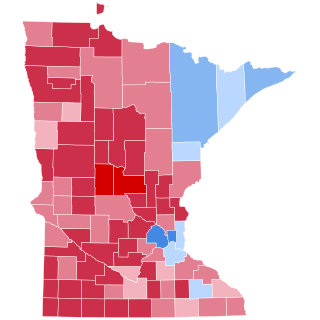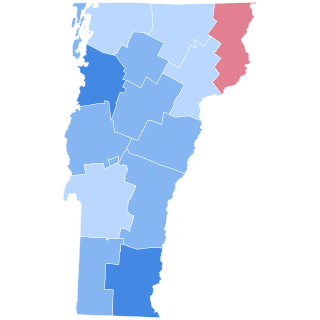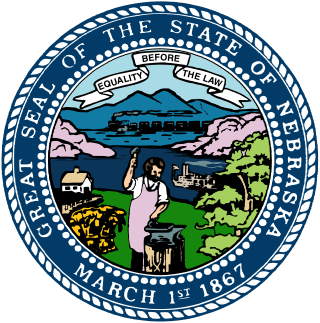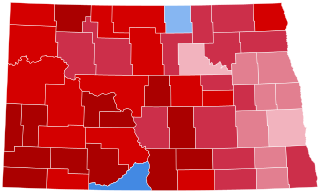See also
 |
|---|
| |||
| |||
The Northern Mariana Islands did not participate in the November 8, 2016 general election for President of the United States, because it is a territory and not a state. However, the five non-incorporated territories that send delegates to the House of Representatives participated in the presidential primaries of both major parties.
In the presidential primaries, voters expressed their preferences for the Democratic and Republican parties' respective nominees for president. Registered members of each party only voted in their party's primary, while voters who were unaffiliated chose any one primary in which to vote. The caucuses for both parties were held in March 2016.
Prior to the Republican caucus, Ralph Torres, the Governor of Northern Mariana Islands, endorsed Donald Trump. [1] The Republican caucus took place on March 15, 2016:
| Candidate | Votes | Percentage | Actual delegate count | ||
|---|---|---|---|---|---|
| Bound | Unbound | Total | |||
| Donald Trump | 343 | 72.82% | 9 | 0 | 9 |
| Ted Cruz | 113 | 23.99% | 0 | 0 | 0 |
| John Kasich | 10 | 2.12% | 0 | 0 | 0 |
| Marco Rubio | 5 | 1.06% | 0 | 0 | 0 |
| Unprojected delegates: | 0 | 0 | 0 | ||
| Total: | 471 | 100.00% | 9 | 0 | 9 |
| Sources: The Green Papers | |||||
On January 11, 2016, Northern Mariana Islander delegate Gregorio Sablan endorsed Hillary Clinton. [2] The Democratic caucus took place on March 12, 2016.
This was the first time that the Northern Mariana Islands participated in the Democratic caucuses.
| Northern Marianas Democratic caucus, March 12, 2016 | |||||
|---|---|---|---|---|---|
| Candidate | Popular vote | Estimated delegates | |||
| Count | Percentage | Pledged | Unpledged | Total | |
| Hillary Clinton | 102 | 53.97% | 4 | 1 | 5 |
| Bernie Sanders | 65 | 34.39% | 2 | 0 | 2 |
| Uncommitted | 22 | 11.64% | 0 | 4 | 4 |
| Total | 189 | 100% | 6 | 5 | 11 |
| Source: [3] | |||||
 |
|---|

Presidential primaries and caucuses were organized by the Democratic Party to select the 4,051 delegates to the 2016 Democratic National Convention held July 25–28 and determine the nominee for President in the 2016 United States presidential election. The elections took place within all fifty U.S. states, the District of Columbia, five U.S. territories, and Democrats Abroad and occurred between February 1 and June 14, 2016. Between 2008 and 2020, this was the only Democratic Party primary in which the nominee had never been nor had ever become President of the United States. This was the first time the Democratic primary had nominated a woman for president.

Presidential primaries and caucuses of the Republican Party took place within all 50 U.S. states, the District of Columbia, and five U.S. territories between February 1 and June 7, 2016. These elections selected the 2,472 delegates that were sent to the Republican National Convention. Businessman and reality television personality Donald Trump won the Republican nomination for president of the United States.
The following is a timeline of major events leading up to, during, and after the 2016 United States presidential election. The election was the 58th quadrennial United States presidential election, held on November 8, 2016. The presidential primaries and caucuses were held between February 1 and June 14, 2016, staggered among the 50 states, Washington, D.C., and U.S. territories. The U.S. Congress certified the electoral result on January 6, 2017, and the new president and vice president were inaugurated on January 20, 2017.

The 2016 United States presidential election in Arkansas was held on Tuesday, November 8, 2016, as part of the 2016 United States presidential election in which all 50 states plus the District of Columbia participated. Arkansas voters chose electors to represent them in the Electoral College via a popular vote, pitting the Republican Party's nominee, businessman Donald Trump, and running mate Indiana Governor Mike Pence against Democratic Party nominee, former Secretary of State Hillary Clinton, and her running mate Virginia Senator Tim Kaine. Arkansas has six electoral votes in the Electoral College.

The 2016 United States presidential election in Minnesota was held on Tuesday, November 8, 2016, as part of the 2016 United States presidential election in which all 50 states and the District of Columbia participated. Minnesota voters chose electors to represent them in the Electoral College via a popular vote, pitting the Republican Party's nominee, businessman Donald Trump, and running mate Indiana Governor Mike Pence against DFL nominee, former Secretary of State Hillary Clinton, and her running mate Virginia Senator Tim Kaine. Minnesota has ten electoral votes in the Electoral College.

The 2016 United States presidential election in Vermont was held on November 8, 2016, as part of the 2016 United States presidential election in which all 50 states plus the District of Columbia participated. Vermont voters chose three electors to represent them in the Electoral College via a popular vote pitting the Republican Party's nominee, businessman Donald Trump, and his running mate Indiana Governor Mike Pence, against the Democratic Party's nominee, former U.S. Secretary of State Hillary Clinton, and her running mate, Virginia Senator Tim Kaine. Independent Vermont Senator Bernie Sanders received a number of unsolicited write-in votes.

The 2016 United States presidential election in Virginia was held on November 8, 2016, as part of the 2016 general election in which all 50 states plus the District of Columbia participated. Virginia voters chose electors to represent them in the Electoral College via a popular vote pitting the Republican nominee, businessman Donald Trump, and running mate Indiana Governor Mike Pence against Democratic nominee, former Secretary of State Hillary Clinton and her running mate, Virginia Senator Tim Kaine.

The 2016 United States presidential election in Illinois was held on Tuesday, November 8, 2016, as part of the 2016 United States presidential election in which all 50 states plus the District of Columbia participated. Illinois voters chose electors to represent them in the Electoral College via a popular vote, pitting the Republican Party's nominee, businessman Donald Trump, and running mate Indiana Governor Mike Pence against Democratic Party nominee, former Secretary of State Hillary Clinton, and her running mate Virginia Senator Tim Kaine. Illinois had 20 votes in the Electoral College.

The 2016 United States presidential election in Rhode Island took place on November 8, 2016, as part of the 2016 United States presidential election in which all 50 states plus the District of Columbia participated. Rhode Island voters chose four electors to represent them in the Electoral College via a popular vote.

The 2016 United States presidential election in Nebraska was held on Tuesday, November 8, 2016, as part of the 2016 United States presidential election in which all 50 states plus the District of Columbia participated. Nebraska voters chose electors to represent them in the Electoral College via a popular vote, pitting the Republican Party's nominee, businessman Donald Trump, and running mate Indiana Governor Mike Pence against Democratic Party nominee, former Secretary of State Hillary Clinton, and her running mate Virginia Senator Tim Kaine. Nebraska has five electoral votes in the Electoral College, two from the state at large, and one each from the three congressional districts.

Although Puerto Rico did not participate in the November 8, 2016, general election because it is a territory and not a state, the five non-incorporated territories that send delegates to the United States House of Representatives participated in the presidential primaries.

The 2016 United States presidential election in Alaska was held on Tuesday, November 8, 2016, as part of the nationwide presidential election in which all 50 states plus the District of Columbia participated. Alaska voters chose electors to represent them in the Electoral College via a popular vote, pitting the Republican Party's nominee, businessman Donald Trump, and running mate Indiana Governor Mike Pence against Democratic Party nominee, former Secretary of State Hillary Clinton, and her running mate Virginia Senator Tim Kaine. Alaska has three electoral votes in the Electoral College.

The 2016 United States presidential election in California was held on Tuesday, November 8, 2016, as part of the 2016 United States presidential election in which all 50 states plus the District of Columbia participated. California voters chose electors to represent them in the Electoral College via a popular vote, pitting the Republican Party's nominee, businessman Donald Trump, and running mate Indiana Governor Mike Pence against Democratic Party nominee, former Secretary of State Hillary Clinton, and her running mate Virginia Senator Tim Kaine. California had 55 electoral votes in the Electoral College, the most of any state.

The 2016 United States presidential election in Idaho was held on Tuesday, November 8, 2016, as part of the 2016 United States presidential election in which all 50 states plus the District of Columbia participated. Idaho voters chose electors to represent them in the Electoral College via a popular vote, pitting the Republican nominee, businessman Donald Trump, and running mate Indiana Governor Mike Pence against Democratic Party nominee, former Secretary of State Hillary Clinton, and her running mate Virginia Senator Tim Kaine. Idaho has four electoral votes in the Electoral College.

The 2016 United States presidential election in Pennsylvania took place on November 8, 2016, as part of the 2016 United States elections in which all 50 states and the District of Columbia participated. Pennsylvania voters chose electors to represent them in the Electoral College via a popular vote.

The 2016 United States presidential election in North Dakota was held on Tuesday, November 8, 2016, as part of the 2016 United States presidential election in which all 50 states plus the District of Columbia participated. North Dakota voters chose electors to represent them in the Electoral College via a popular vote, pitting the Republican nominee, businessman Donald Trump, and running mate Indiana Governor Mike Pence against Democratic nominee, former Secretary of State Hillary Clinton, and her running mate Virginia Senator Tim Kaine. North Dakota has three electoral votes in the Electoral College.

The U.S. Virgin Islands did not participate in the November 8, 2016 general election because it is a territory and not a state. However, the five non-incorporated territories that send Delegates to the House of Representatives did participate in the presidential primaries.

Although American Samoa did not participate in the 2020 presidential election because it is a U.S. territory and not a state, it still participated in the U.S. presidential primaries and caucuses. Former mayor Michael Bloomberg won the Democratic caucus, held on March 3. The Republican caucus, in the form of a territorial convention held on March 18, endorsed incumbent President Donald Trump.

Although the Northern Mariana Islands did not participate in the 2020 presidential election because it is a U.S. territory and not a state, it still participated in the U.S. presidential primaries and caucuses. Senator Bernie Sanders won the Democratic caucus, held on March 14, which would be his last win in the 2020 primary season. The Republican caucus, held on March 15 during the party's commonwealth convention, unanimously voted for incumbent President Donald Trump.

Although Guam did not participate in the 2020 presidential election because it is a U.S. territory and not a state, it still participated in the U.S. presidential primaries and caucuses. Former vice president Joe Biden won the Democratic caucus, held on June 6. The Republican caucus, held on March 14 in the form of a "state convention", endorsed incumbent President Donald Trump.